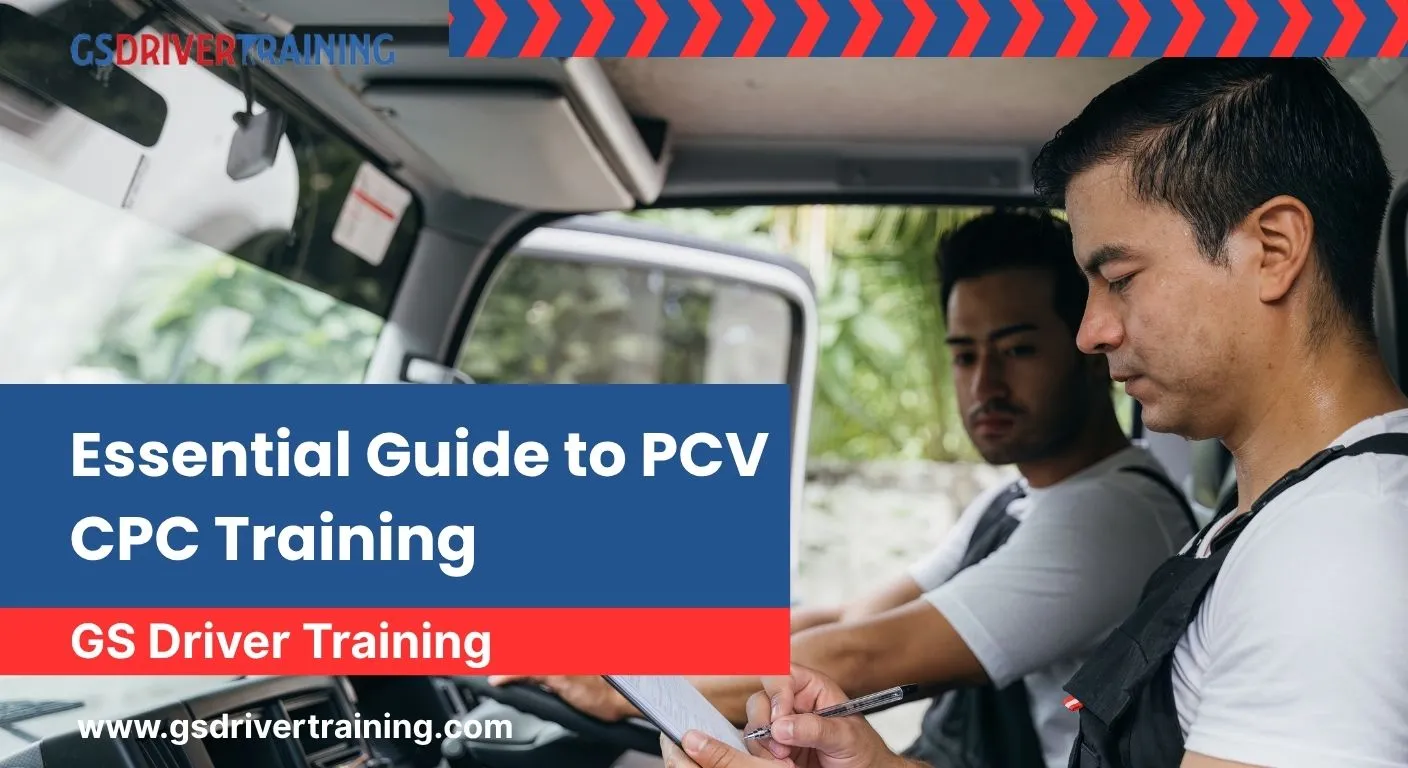Ever wondered why every professional bus, coach or minibus driver in the UK and Europe must complete dedicated PCV CPC training before hitting the road? Navigating Driver Certificate of Professional Competence requirements can feel overwhelming when licences, theory tests, practical modules and periodic renewal cycles all demand attention. This guide delivers clear, actionable insight into the full spectrum of PCV CPC training: from legal prerequisites and initial qualification modules through to the 35-hour periodic training cycle, career-boosting benefits, course content deep-dives and top tips on choosing an accredited provider. You’ll learn exactly who needs a PCV CPC, how to obtain and maintain a Driver Qualification Card, what each module covers, why ongoing training enhances safety and professionalism, and how to plan cost-efficient renewal—all in one place. With up-to-date information for October 2025, you’ll gain confidence in complying with DVSA and JAUPT standards and unlocking new career opportunities behind the wheel.
What Are the PCV CPC Requirements for Professional Drivers?
PCV CPC requirements define the mandatory certification and ongoing training professional drivers must complete to operate passenger-carrying vehicles safely and legally. A Passenger Carrying Vehicle Certificate of Professional Competence ensures drivers possess core knowledge of road safety, drivers’ hours regulations and vehicle operation standards. For new drivers, initial qualification combines theory and practical assessments, while existing licence holders must complete 35 hours of periodic training every five years. These requirements protect road users, maintain high industry standards and reduce liability for operators. Understanding who needs a CPC qualification and how to apply for a PCV licence lays the foundation for compliant, professional driving careers.
Who Needs a PCV CPC Qualification?
Any driver who carries passengers for hire or reward in a bus, coach or minibus must hold a valid PCV CPC qualification alongside the appropriate PCV licence category. This includes full-time commercial drivers, part-time shuttle operators, community transport volunteers and tour coaches. Even occasional contracts to transport paying passengers trigger the legal requirement for both initial qualification and periodic training cycles. Ensuring the right audience completes CPC training maintains consistent safety standards across all passenger-carrying operations.
What Is the Initial PCV CPC Qualification Process?
Initial PCV CPC qualification combines four distinct modules designed to confirm theory knowledge and practical competence before issuing a Driver Qualification Card. Module 1 tests multiple-choice questions and hazard perception; Module 2 uses case studies to assess judgement in real-world scenarios; Module 3 evaluates on-road and off-road driving skills; Module 4 measures practical demonstration of vehicle safety checks and emergency procedures. Passing all four modules within the prescribed validity period secures a Driver Qualification Card valid for five years and activates the periodic training cycle.
How Do You Obtain a PCV Licence?
Obtaining a PCV licence begins with applying for a provisional licence, passing a medical examination and completing theory and practical tests. You must first hold a Category D1 or D entitlement, which allows you to drive vehicles carrying up to 16 passengers or larger coaches respectively. After passing the PCV theory test (multiple choice and hazard perception), you book the practical driving test and practical demonstration assessment. Upon successful completion of tests and CPC modules, you receive a full PCV licence and the Driver Qualification Card, authorizing professional operation on public roads.
PCV Licence Categories at a Glance
What Is the Driver Qualification Card (DQC) and How Is It Issued?
The Driver Qualification Card is a mandatory plastic card proving a driver’s valid CPC status and must be carried at all times. Issued by the Driver and Vehicle Standards Agency upon passing initial qualification modules, the DQC records the five-year validity cycle and serves as proof during roadside checks. Renewal requires completion of 35 hours of approved periodic training before expiry. Maintaining a current DQC safeguards legal compliance and confirms continued professional competence.
How Is the PCV CPC Initial Qualification Structured?
PCV CPC initial qualification is structured around four distinct modules that assess theoretical knowledge and practical skills critical for passenger transport safety. Each module targets a core competency—understanding road rules, applying problem-solving in case studies, demonstrating vehicle control and conducting safety checks—and combines to confirm overall fitness to drive. Completing this structured sequence ensures drivers can navigate real-world scenarios confidently and maintain high standards from day one.
What Does Module 1: Theory Test Cover?
Module 1 combines a multiple-choice exam and a hazard perception test to evaluate drivers’ understanding of road regulations, safety protocols and hazard recognition. The multiple-choice section addresses UK and EU traffic law, speed limits, signage, loading regulations and drivers’ hours rules. The hazard perception segment uses video clips of evolving road situations, measuring response time to developing hazards. Mastery of this module underpins safe decision-making on busy roads and prepares drivers for dynamic environments.
How Do Module 2 Case Studies Prepare Drivers for Real Scenarios?
Module 2 presents scenario-based questions that simulate passenger-carrying challenges, such as managing delays, handling vulnerable passengers, responding to mechanical faults and coping with adverse weather. Each case study tests decision-making logic: drivers analyse written scenarios, select best practice actions and justify choices based on safety and compliance criteria. By practising these simulations, trainees build judgment skills that directly translate into improved risk management on actual routes.
What Skills Are Assessed in Module 3: Practical Driving Test?
Module 3 evaluates on-road and off-road driving competencies, focusing on vehicle control, precise manoeuvres and adherence to traffic regulations. Examiners observe reversing exercises, blind-spot checks, emergency stop execution and safe navigation in urban and rural settings. This practical test confirms drivers can operate large vehicles confidently, maintain correct road positioning and execute safety-critical skills in diverse environments.
What Is Included in Module 4: Practical Demonstration Test?
Module 4 tests practical demonstration of vehicle safety checks and emergency procedures through “Show Me, Tell Me” questions. Drivers inspect braking systems, lights, steering, tyres and seatbelts, identifying defects and demonstrating emergency control measures. This hands-on assessment verifies understanding of pre-journey inspection routines and ability to respond to faults—essential skills for maintaining passenger safety and reducing roadside breakdowns.
What Are the PCV CPC Periodic Training Requirements?
Periodic training refreshes and expands driver knowledge, ensuring long-term competence and compliance with evolving regulations. PCV CPC drivers must complete 35 hours of approved periodic training every five years, broken into a minimum of seven-hour teaching modules. This structured renewal cycle maintains professional standards, reduces accident risks and fosters continuous improvement in areas like drivers’ hours, eco-driving and passenger care.
How Many Hours of Periodic Training Are Required Every 5 Years?
Professional PCV drivers must complete exactly 35 hours of periodic CPC training within each five-year validity period of their Driver Qualification Card. Training is delivered in modules of at least seven hours each, requiring a minimum of five separate sessions to cover varied subjects. This ensures consistent knowledge updates and limits repetition, promoting fresh learning experiences throughout each cycle.
What Are the Common 7-Hour Periodic Training Modules?
Periodic training modules cover core industry topics designed to enhance safety, efficiency and passenger service. The most frequent seven-hour modules include:
- Drivers’ Hours and Tachographs—regulation updates and digital device operation
- Vehicle Safety and Maintenance—advanced defect detection and repair protocols
- Emergency Procedures and First Aid—passenger evacuation and medical response
- Eco-Driving and Fuel Efficiency—techniques to reduce fuel consumption and emissions
- Customer Service and Disability Awareness—best practices for passenger care and communication
These modules blend theory, discussion and practical exercises to reinforce essential skills and promote best practices across professional driving.
How Do You Renew Your Driver Qualification Card (DQC)?
Renewal of the Driver Qualification Card involves completing the full 35-hour periodic training requirement and submitting a DQC renewal application before expiry. After finishing approved modules, drivers receive training confirmation documents that accompany the DQC application. Processing normally takes up to three weeks, during which continuing operations are permitted. Timely renewal avoids fines and licence suspension.
What Are the Rules About Repeating CPC Modules?
DVSA guidelines stipulate that drivers may not repeat the same periodic training module within a single five-year cycle unless exceptional circumstances apply. This rule encourages varied learning topics and prevents drivers from relying on familiar material. Selecting diverse modules maximizes knowledge gains and ensures compliance with regulatory objectives for continuous professional development.
What Are the Key Benefits of Completing PCV CPC Training?
PCV CPC training delivers multiple advantages: it elevates road safety, reinforces professionalism, ensures legal compliance and unlocks career and economic opportunities for drivers and employers alike. By engaging in both initial and periodic training, drivers cultivate advanced skills that enhance passenger comfort, reduce accident rates and support operational efficiency across transport organizations.
How Does PCV CPC Training Enhance Road Safety and Professionalism?
PCV CPC training enhances road safety by equipping drivers with up-to-date knowledge of hazard perception, emergency procedures and regulatory changes. Practical modules build precise vehicle handling abilities while case studies sharpen judgment in unpredictable situations. This combination of theory and hands-on experience promotes higher standards of professionalism, leading to measurable reductions in accident rates and improved passenger confidence.
What Legal Compliance Benefits Does PCV CPC Provide?
Maintaining a valid Driver Qualification Card through timely training helps drivers and operators avoid fines, licence suspensions and enforcement actions. Compliance with CPC regulations demonstrates adherence to drivers’ hours limits, vehicle maintenance standards and passenger welfare requirements. Employers benefit from reduced liability exposure and strengthened reputations by employing CPC-qualified personnel.
How Can PCV CPC Training Improve Career Opportunities?
Holding a PCV CPC qualification broadens job prospects across bus, coach, school transport and community services sectors. Drivers with up-to-date CPC credentials can pursue specialist roles—such as tour coach operation, school transport coordination and disability transport services—often with higher pay and responsibility. Continuous training signals commitment to excellence, making candidates more attractive to top employers.
What Economic Benefits Do Employers Gain from CPC Training?
Employers investing in CPC training see lower fuel costs, fewer breakdowns and reduced insurance premiums due to improved driver competencies. Eco-driving modules contribute to fuel-saving practices, while preventive safety checks minimize downtime and repair expenses. Enhanced customer service skills also boost passenger satisfaction and repeat business, generating further revenue growth for transport operators.
What Does the PCV CPC Course Content Include?
PCV CPC course content spans regulatory, technical and interpersonal domains to ensure drivers master all facets of professional passenger transport. Core subject areas include drivers’ hours regulations, digital tachograph operation, vehicle safety and maintenance, emergency response and first aid, eco-driving techniques, and customer service with disability awareness. This comprehensive curriculum balances theoretical updates with practical application to reinforce best practices on the road.
How Do Drivers’ Hours and Tachograph Training Impact Compliance?
Drivers’ hours and tachograph modules clarify legal limits on driving time, rest requirements and data analysis of digital recording devices. Drivers learn to interpret tachograph charts, manage log-book entries and avoid infringements that carry heavy penalties. Mastery of these regulations supports fatigue management, reduces the risk of enforcement action and ensures safer journey planning.
What Vehicle Safety and Maintenance Topics Are Covered?
Vehicle safety and maintenance training covers detailed pre-journey checks, defect identification, basic repair techniques and record-keeping procedures. Drivers practice inspecting braking systems, lights, tyres and steering components to detect faults early. Understanding maintenance schedules and emergency repair protocols minimizes roadside breakdowns and upholds passenger safety standards.
What Emergency Procedures and First Aid Are Included?
Emergency procedures modules teach evacuation planning, fire response, passenger assistance and essential first-aid techniques—such as CPR, bleeding control and managing shock. Scenario drills simulate incidents like vehicle collisions and onboard medical emergencies, enabling drivers to respond calmly and effectively. These life-saving skills protect passengers and enhance professional preparedness.
How Does Eco-Driving and Fuel Efficiency Training Benefit Drivers?
Eco-driving modules introduce techniques to reduce fuel consumption and environmental impact, including smooth acceleration, optimized gear selection and route planning. Drivers learn to monitor fuel usage, interpret telematics data and adopt driving styles that lower CO₂ emissions. Improved fuel efficiency yields cost savings for operators and contributes to sustainability goals across the transport sector.
What Customer Service and Disability Awareness Skills Are Taught?
Customer service and disability awareness training focuses on communication techniques, empathy and safe assistance for passengers with reduced mobility or sensory impairments. Drivers develop skills in handling wheelchairs, using onboard facilities correctly and delivering courteous interactions. Enhanced passenger care fosters inclusive transport experiences and reinforces professional service standards.
How Do You Choose the Right PCV CPC Training Provider?
Choosing the right PCV CPC training provider ensures high-quality instruction, regulatory compliance and value for investment. Key selection criteria include official accreditation, course format flexibility, transparent pricing and convenient locations. Evaluating these factors helps drivers and employers partner with organizations that deliver up-to-date content, expert instructors and seamless learning experiences.
Why Is DVSA and JAUPT Approval Important for Training Providers?
DVSA and JAUPT approval certifies that a provider’s course content, instructors and facilities meet government standards for CPC instruction. Approved centres undergo regular audits to verify curriculum accuracy, delivery methods and record-keeping processes. Selecting a DVSA- and JAUPT-accredited provider safeguards compliance, guarantees recognized certification and minimizes the risk of invalid training hours.
What Course Formats and Scheduling Options Are Available?
Training formats include classroom-based workshops, live online webinars and blended learning combining e-learning modules with in-person sessions. Providers offer flexible schedules—weekends, evenings or intensive block courses—to accommodate full-time drivers’ busy calendars. Choosing the right format depends on individual learning preferences, time constraints and access to training facilities.
How Much Does PCV CPC Training Cost and Are There Funding Options?
PCV CPC training costs vary by provider, location and course format, with initial qualification ranging from £400–£700 and periodic modules averaging £50–£100 per day. Employers often sponsor training as part of professional development budgets, while apprenticeship schemes and government grants can subsidize costs for eligible candidates. Comparing fee structures and funding avenues helps drivers secure affordable, accredited CPC courses.
You Can Also Read: Understanding PCV Licence Costs and Training for Your Career
Where Can You Find Approved PCV CPC Training Centres?
Approved training centres are listed on official government and regulatory websites, industry association directories and provider accreditation registers. Regional transport associations and professional driver forums also share recommendations and reviews. Prioritizing centres with strong reputations, modern facilities and positive learner feedback ensures a quality training experience.








